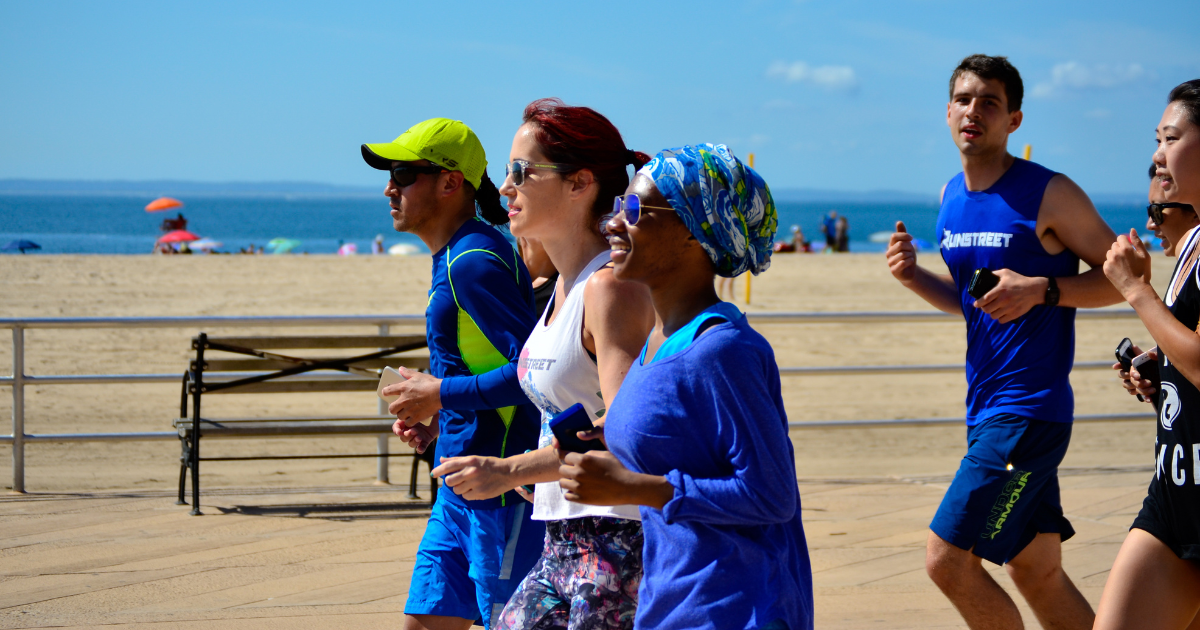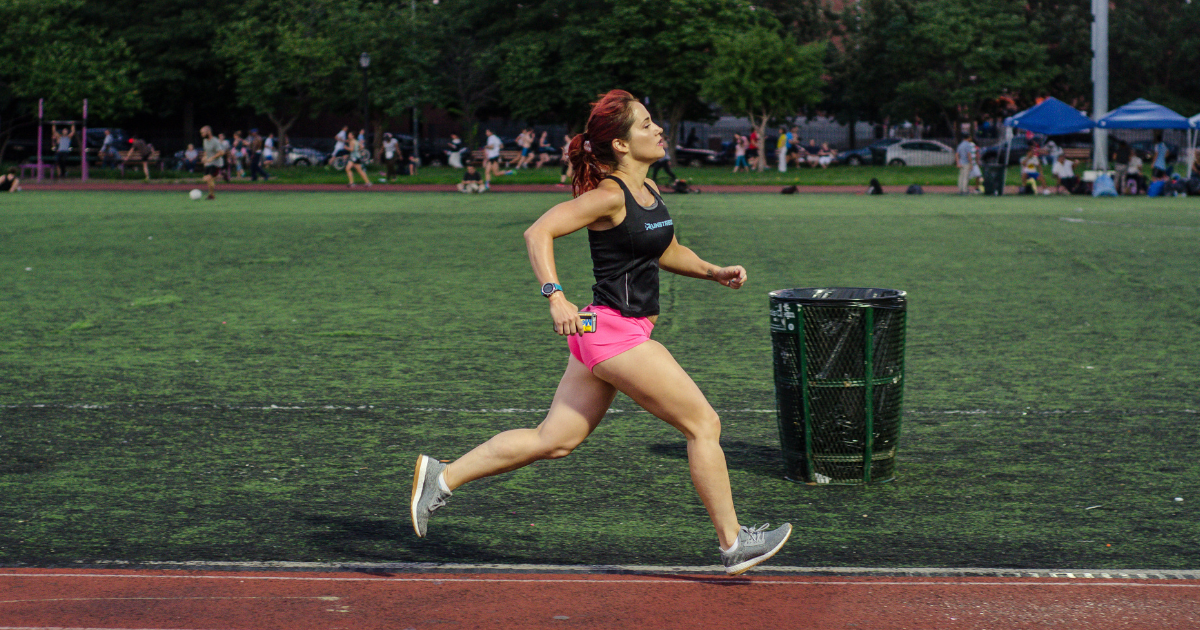Guide to Running a Half Marathon - Tips from a Run Coach
Photo by Marques Jackson Photography at Runstreet Coney Island.
By Marnie Kunz, NASM-certified trainer, USATF- RRCA-certified run coach
If you’re planning on running a half marathon, this guide includes my top coaching tips to help you get to the finish line. Whether you’re running your first half marathon or your tenth, these training strategies will help prepare you to conquer 13.1 miles on race day. The half marathon is an exciting long-distance race that offers a motivating and challenging training goal. With a well-planned half marathon training schedule, you can have an amazing race. If you need a training plan, check out our 12-Week Half Marathon Training Plan with Speed Workouts or other plans in the Runstreet Training Center.
Disclosure: If you buy products through our links, Runstreet may earn a small affiliate commission at no extra expense to you. We only recommend products we use and like. See our Disclosure for more details.
Before Running a Half Marathon - What You Need
The running gear checklist includes running shoes.
When you begin training, you’ll need some basic gear to keep you running injury-free. Here’s a checklist of training essentials to help you get started:
Running shoes are your most important piece of equipment for half marathon training. If you’re not sure what shoes to choose, go to your local running store and get fitted. They can help you find the most comfortable shoes for your training conditions, gait style, and personal preferences.
Running clothes have moisture-wicking materials that keep you dry on the run. Opt for layers when you’re dressing for your runs so you can take off the top layers if you get too warm. A running hat, sunscreen, and sunglasses can also help protect you from the elements on the run.
A GPS Smartwatch, fitness tracker, or run tracking app will help you track your running distance and pace. If you’re looking for a great running watch, I highly recommend the Garmin Forerunner 55, which I use to track my runs and daily step count. If you don’t have a fitness tracker, there are many free running apps you can download on your phone and use.
A running fuel belt or hydration pack is especially useful for long runs so you can carry your fuel and hydration easily. I love my CamelBak Hydrobak Hydration Pack for long runs and running in hot weather.
Training for a Half Marathon
The most helpful tool for half marathon training is a training plan. Following a training program will build your weekly mileage gradually, improve your endurance with long runs, and help you with any race pace goals you have. Check out our Customized Half Marathon Training Plan for a program designed just for you by a certified run coach and trainer (me:) who has helped hundreds of runners slay their half marathon races around the world.
Here are the ingredients of a successful half marathon training program:
Base Runs
Base runs - also called Zone 2 training - are the staple workout you’ll do when you’re preparing for running a half marathon. Base runs are relaxed pace, “easy runs” that you’ll do at your natural pace. You should be able to carry a conversation at this pace.
Related Post: Complete Guide to Zone 2 Training
Long Runs
Your training plan should include a weekly long run to build your endurance for running a half marathon. Following the principle of progression, your long runs will add mileage gradually to get your body accustomed to running for longer distances.
According to the National Academy of Sports Medicine, the principle of progression states that your training distance or intensity can increase by no more than 10 percent from week to week to minimize your risk of injury while still pushing you to improve your fitness level. For long runs, you’ll gradually conquer longer distances to prepare your body and mind for running 13.1 miles (21 km).
Related Post: 10 Long Run Tips from a Run Coach
Speed Workouts
Half marathon training tips to get you to the finish line.
For beginners, finishing the race at any pace is usually the primary goal. For experienced runners, doing speed workouts will help you run your goal time. Speed training for half marathons often includes intervals and tempo runs.
Intervals are periods of intense, fast running followed by active recovery with jogging. Tempo runs are sustained effort, “comfortably hard” runs that improve your oxygen efficiency and ability to run fast for long periods of time.
Related Post: Best Half Marathon Workouts to Get Faster
Rest and Recovery
Rest and recovery should be a central part of your training. For most runners, I recommend taking at least one rest day per week to give your body enough recovery time. You can take a complete rest or do some light cross training like walking or yoga.
Cross-training
Cross-training for runners is any exercise other than running. Cycling, yoga, pilates, swimming, walking, hiking, and the elliptical trainer all offer excellent low-impact cross training workouts for half marathon runners.
Doing at least one day a week of cross training helps improve your fitness level and strength to make you a better athlete.
Related Post: Guide to Cross Training for Runners
Strength Training
Strength training offers so many benefits, from making your muscles stronger to reducing your risk of running injuries. If you’re a first-timer, start with bodyweight exercises at least twice a week to improve your strength. For advanced strength training, you can use weights to increase your intensity.
Nutrition
Good nutrition will help you stay energized for training. I have met too many runners who didn’t want to eat enough and often suffered from low energy and running injuries.
Photo by Marques Jackson Photography at Runstreet LA Art Run.
Opt for whole grains, with foods like brown rice, oatmeal, sweet potatoes, quinoa, and whole wheat bread for healthy carbohydrates for half marathon training. Protein is also essential for muscle recovery and rebuilding. Choose high-protein snacks and foods like lentils, nuts, lean meats, Greek Yogurt, and smoothies for improved muscle recovery and strength.
Hydration is also crucial for running a half marathon. Drink plenty of water throughout the day and bring water with electrolytes (I love Nuun tablets) or sports drinks on your runs to stay hydrated. It’s especially important to bring hydration on your long runs and when training in heat and humidity.
For long runs, you’ll also need running fuel to replenish glycogen stores that your body burns through after about an hour of running. For any runs over an hour, bring running gels, gu, or energy bars to consume on the go. Experiment with different fuels on your long runs until you find one that works well for your tastes and digestion.
I love Honey Stinger Mini Waffles on long runs and also Honey Stinger Energy Chews. The delicious taste of Honey Stingers helps me power through long runs and races.
Race Preparation
As your half marathon approaches, the last two weeks of your training plan should include a taper, where you reduce your mileage. This gives your body a boost to fully recover from training before your big race.
Before race day, prepare everything you need so you can get up and go. Check the weather forecast, assemble your race outfit, and make sure you have your running fuel and hydration. Arrive at the race early so you have time to use the restroom, warm up, and mentally prepare for your race.
FAQs
How many months does it take to run a half marathon?
The amount of time you need to train for a half marathon depends on your fitness level and goals. For beginners, it usually takes at 8 to 12 weeks to train. Advanced runners may need less time but if you have a speed goal, it can take at least 6 weeks to start seeing results from speed workouts so usually 8 weeks is a good minimum training period.
How do beginners train for a half marathon?
Beginners should follow a Half Marathon Training Plan for Beginners. Your plan will include weekly long runs, base runs, and rest days to help you build your endurance and fitness level gradually.
What is the minimum training for a half marathon?
Half-marathon training schedules can vary but usually it takes a minimum of 8 weeks of training to run a half marathon. Beginners usually need at least 8 to 12 weeks to train.
How long do you need from couch to half marathon?
If you are new to running, it would take you at least 3 months (12 weeks) to go from no running to completing a marathon.
Are you running a half marathon soon? Follow and tag @Runstreet on Instagram to share your training and get cheered on. If you need a half marathon training plan to have an incredible race, head to the Runstreet Training Center.
Related Posts: Love Run Philly Half Marathon Review, 15 Best Half Marathon Races in the World, Guide to Half Marathon Training for Beginners
Marnie Kunz is a NASM-certified trainer and USATF- and RRCA-certified running coach, a dog lover, an Akita mom, and the founder of Runstreet. She specializes in helping runners get faster and stronger and helping beginners elevate their fitness levels. She is based in Brooklyn, New York.





